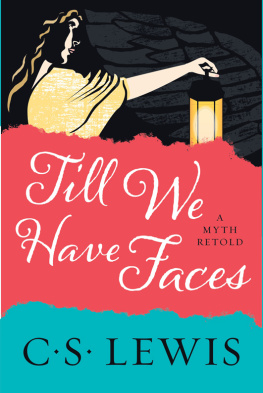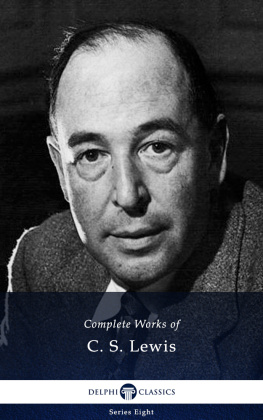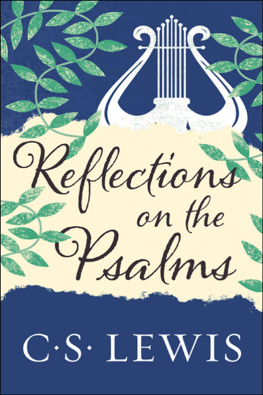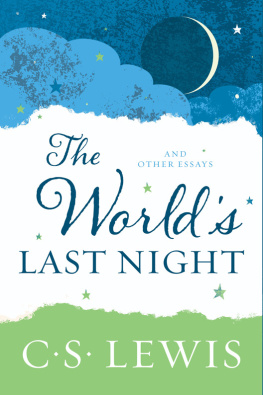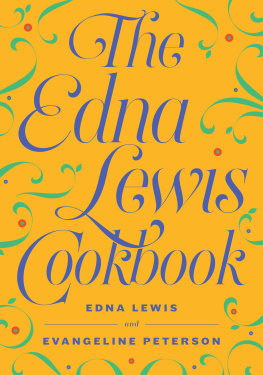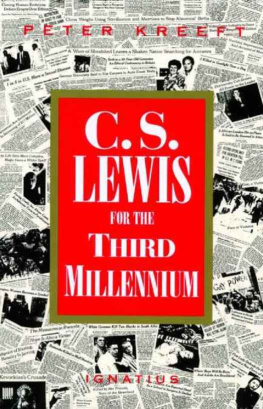C. S. Lewis - God in the Dock
Here you can read online C. S. Lewis - God in the Dock full text of the book (entire story) in english for free. Download pdf and epub, get meaning, cover and reviews about this ebook. year: 1970, genre: Religion. Description of the work, (preface) as well as reviews are available. Best literature library LitArk.com created for fans of good reading and offers a wide selection of genres:
Romance novel
Science fiction
Adventure
Detective
Science
History
Home and family
Prose
Art
Politics
Computer
Non-fiction
Religion
Business
Children
Humor
Choose a favorite category and find really read worthwhile books. Enjoy immersion in the world of imagination, feel the emotions of the characters or learn something new for yourself, make an fascinating discovery.

God in the Dock: summary, description and annotation
We offer to read an annotation, description, summary or preface (depends on what the author of the book "God in the Dock" wrote himself). If you haven't found the necessary information about the book — write in the comments, we will try to find it.
God in the Dock — read online for free the complete book (whole text) full work
Below is the text of the book, divided by pages. System saving the place of the last page read, allows you to conveniently read the book "God in the Dock" online for free, without having to search again every time where you left off. Put a bookmark, and you can go to the page where you finished reading at any time.
Font size:
Interval:
Bookmark:
GOD IN THE
DOCK
ESSAYS ON THEOLOGY AND ETHICS
by
C. S. LEWIS
edited by
WALTER HOOPER

CONTENTS
Dr Johnson, speaking of an eighteenth-century theologian, remarked that he tended to unsettle every thing, and yet settle nothing. I wonder what the robust Doctor would make of our age: an age in which one sees in most bookshops and Sunday papers the controversialand, oftentimes, apostateworks of clergy who unsettle every article of the Faith they are ordained and paid to uphold. It is, partly because of this, a pleasure for me to offer as an antidote this new book by C. S. Lewis.
I say new because, though these essays and letters were written over a period of twenty-four years, almost all are published in book-form for the first time. Considering how rapidly theological fashions change, it might be expected that these pieces would already be old stuff. There are, however, I expect, others like myself who are more concerned with whether a book is true than whether it was written last week. I believe that Lewiss refusal to compromise, neck or nothing, Heaven or Hell, does not for one moment detract from their relevance to the basic problems which still assail us.
Because of my desire to read everything that Lewis wrote, I undertook the long but happy task of excavating his contributions to ephemeral publications. Now, at last, my years of searching libraries and reading faded newsprint are over. But, more important, I anticipate that the majority of them will have never been seen by most readers, and I hope they will derive as much satisfaction as I do from having them firmly stitched between two boards.
Since these new Lewisiana have been culled from such a wide variety of sources, they make, as might be expected, a very mixed bag. I do not apologize for this because so much of their interest lies in the many different angles from which we are able to view the Christian religion. Lewis never received a penny for most of them. Some of the essays were written simply because he felt the topic badly needed ventilating and the healthy position defending; others at the request of a newspaper or a periodical; there are other pieces, such as the ones from The Socratic Digest, which he composed for the purpose of defending the Faith against the attacks of agnostics and atheists.
Because Lewis knew how to adapt his material to suit the audience he was writing for, the essays differ both in length and in emphasis. Nevertheless, all share a particular seriousness. Not gloominess, for they sparkle with wit and common sense; but seriousness because of the high stakes which Lewis believed were involved in being a mana possible son of God or a possible candidate for hell.
During his years as an agnostic, Lewis wanted to know the answers to such questions as why God allows pain, why Christianityout of all other religionswas held to be the true one, why and if miracles actually happen. As a result, he quite naturally anticipated the questions other men ask. After his conversion in 1931, Lewis, who seldom refused an invitation to speak or write about the Faith, found himself moving in very different circles. He preached to and argued with fellow dons, industrial workers, members of the Royal Air Force, and university students. It was partly due to this varied experience that he came to see why the professional theologians could not make Christianity understandable to most people. As a result, he set himself the task of translating the Gospel into language which men use and understand. He believed that if you found it difficult to answer questions from men of different trades it was probably because You havent really thought it out; not to the end; not to the absolute ruddy end.
There were many Christians in Oxford in the early 1940s who, like Lewis, felt that both the pros and the cons of the Christian religion should be discussed openly. This led to the foundation of the Socratic Club in 1941. Lewis was the obvious person for the presidency, a position he held until he went to Cambridge in 1954. Meetings were (and still are) held every Monday evening in Term. One Monday a Christian would read a paper, to be answered by an unbeliever, and the following Monday an agnostic or atheist would read a paper which was, in turn, answered by a Christian. Lewis had always relished rational opposition, and the Socratic Club served as the perfect arena for testing the strengths and weaknesses of his apologetics. One example of the kind of paper he read at the Socratic is Religion without Dogma? which he wrote as a reply to Professor H. H. Prices paper on The Grounds of Modern Agnosticism.
It was difficult for the most able unbeliever to contend with Lewiss formidable logic and immense learning in the Socratic Club. On the other hand, we find him, in his articles in The Coventry Evening Telegraph and popular magazines, adapting his language and logic to less educated people. Pieces such as Religion and Science and The Trouble with X..., with their lucidity and apt analogies, have unmasked many popular fallacies about the supposed opposition between religion and science, and have led many people to understand what Christianity is about.
Regardless of ones education, it is impossible to decide whether Christianity is true or false if you do not know what it is about. And, just as there were many who were totally ignorant of Christianity when Lewis began to write, so there are many today who do not know what the real issue is. It is foolish to pretend. The recent flood of autobiographical explanations why such and such a bishop or parson cannot accept the Christian Faith has, I expect, driven many people into deeper ignorance and also (perhaps) into the despairing belief that it could not be understood however hard one tried.
For Lewis, who believed that to be born meant either an eventual surrender to God or an everlasting divorce from Him, this was a serious matter. One day he and I were speculating as to what would happen if a group of friendly and inquisitive Martians suddenly appeared in the middle of Oxford and asked (those who did not flee) what Christianity is. We wondered how many people, apart from voicing their prejudices about the Church, could supply them with much in the way of accurate information. On the whole, we doubted whether the Martians would take back to their world much that is worth having. On the other hand, there is nothing, Lewis argued, in the nature of the younger generation which incapacitates them for receiving Christianity. But, as he goes on to say, no generation can bequeath to its successors what it has not got.
What it has not got. The question as to why it has not got it is, obviously, too complex for me to answer. Nevertheless, having been a college chaplain for five years, I can see that much of the ignorance today is rightly attributed by Lewis to the liberal writers who are continually accommodating and whittling down the truth of the Gospel. And what Lewis would most emphatically not do is whittle down.
He believed that, regardless of the temporary fashions which our ideas about God and morality pass through, there is nothing which can make the Everlasting Gospel out of date. (All that is not eternal is eternally out of date.) On the other hand, he believed that our methods of getting the truth across must often vary. Indeed, his own methods vary considerably: but he nowhere attempts to empty God out with the bath-water. For instance, we have from Lewiss pen straightforward apologetical works such as Mere Christianity and The Problem of Pain, theological satires such as The Screwtape Letters and The Great Divorce, and (for lack of a better word) his concealed Christianity in the interplanetary novels and the Chronicles of Narnia.
Next pageFont size:
Interval:
Bookmark:
Similar books «God in the Dock»
Look at similar books to God in the Dock. We have selected literature similar in name and meaning in the hope of providing readers with more options to find new, interesting, not yet read works.
Discussion, reviews of the book God in the Dock and just readers' own opinions. Leave your comments, write what you think about the work, its meaning or the main characters. Specify what exactly you liked and what you didn't like, and why you think so.

